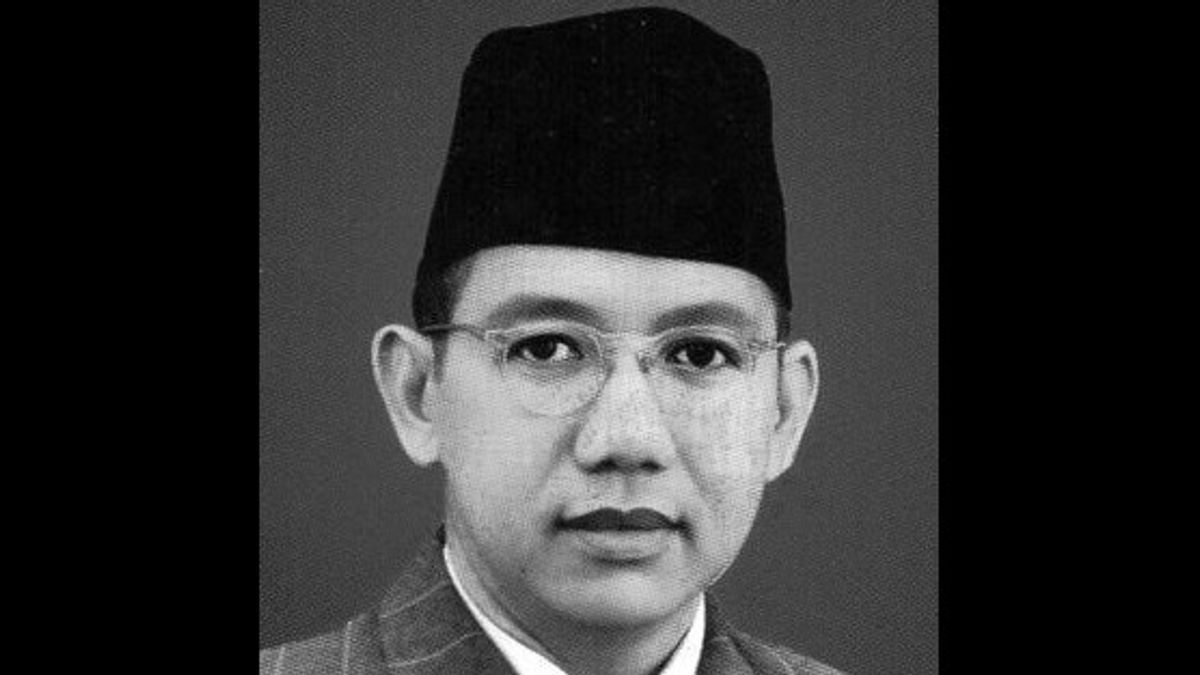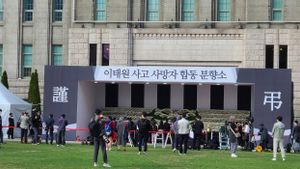JAKARTA - The history of the birth of the Indonesian state cannot be separated from the role of KH Abdul Wahid Hasyim. He was one of the brains in the formulation of Pancasila and the Jakarta Charter. As part of the Nine Committee, Wahid Hasyim had a hand in passing the narrative of the first precept: Belief in One God. The buzz continues. When he served as Minister of Religion, he stood up for all religions.
The forerunner of the independence of the Indonesian nation cannot be separated from the role of BPUPKI. The emergence of BPUPKI is the fruit of the struggle of the bumiputras free from the shackles of Japanese colonialism. Big names, such as Rajiman Wediodiningrat, Soekarno, Hatta, Ki Hajar Dewantara, and Wahid Hasyim became the most remembered members.
The presence of these figures is considered to represent cross schools of thought. As members of BPUPKI, they have their own duties. These tasks include the formulation of the form of the state, state boundaries, to the basic philosophy of the state.
The first BPUPKI session was held from 29 May-1 June. The trial was warm. BPUPKI members who attended reached 68 people. As a result, a historic event was successfully inscribed on June 1.
During the special session, Soekarno put forward the "five principles" Pancasila doctrine which later became the official philosophy of an independent Indonesia: nationality, humanity, democracy, welfare, and divinity. After that came the proposal that Indonesia breathe Islam. The proposal has long been known as the Jakarta Charter.

“Although these principles are generally accepted by BPUPKI members, Islamic leaders are not happy because Islam does not seem to be playing a special role. Finally, they agreed to a compromise called the Jakarta Charter which states that the state will be based on 'divinity' with the obligation to carry out Islamic law for its adherents."
"The implications of the Jakarta Charter for the relationship between Islamic law and the state will be a source of fierce conflict in the years to come," wrote historian MC Ricklefs in the book History of Modern Indonesia 1200-2004 (2005).
As a follow-up, all members of BPUPKI formed a Committee of Nine. Sukarno was chosen as the leader of the political compromise. While the members are Mohammad Hatta, AA Maramis, Abikoesno Tjokrosoejoso, Abdul Kahar Moezakir, Agus Salim, Achmad Subardjo, Wahid Hasyim, and Mohammad Yamin. This committee aims to ensure and get a decision on previous ideas regarding the formulation of the state constitution.
“Among these nine people there is a moderate and tolerant Christian figure, namely AA Maramis, while the other eight are Muslim, although they may have different political ideologies. Soekarno, Hatta, Achmad Subardjo, and Yamin represent the political ideology of nationalism."
“Meanwhile, Abikoesno, Kahar Moezakir, Salim, and Wahid Hasyim are supporters of Islamic political aspirations. If we look at the last four from an Islamic point of view, we will get the following picture: Abi-kusno is from SI, Kahar Moezakir from Muhammadiyah, Salim from PI Penyedar, and Wahid Hasyim from NU," said Ahmad Syafii Maarif in the book Islam and Politics: The Bamboo Splitting Theory for the Guided Democracy Period 1959-1965 (1996).
Fierce debatePolitical compromise on the two patterns of thought – nationalist and Islamic – lasted 21 days fiercely. On June 22, the Committee of Nine approved Pancasila as the state's foundation. But the order of the precepts has changed.
The subject of "God Almighty" appears as the most important. It was also given an accompanying sentence "with the obligation to carry out Islamic law for its adherents."
The Jakarta Charter was finally ratified as the Preamble to the 1945 Constitution. However, this compromise only lasted for 57 days or precisely on August 18, 1945. The accompanying sentences consisting of seven or eight words were considered discriminatory by a number of bumiputras in the Eastern hemisphere.
This difference of opinion prolongs the difference. Moreover, both Kahar Moezakir and Ki Hadikusumo remained adamant in passing the Jakarta Charter for approval. Otherwise, both of them suggested that all references to Islam should be completely removed from the Jakarta Charter.
The tension made Soekarno as the leader of the Committee of Nine unable to sleep. However, the NU figure who is also the father of Abdurrahman Wahid (Gus Dur), Wahid Hasyim acted as an intermediary. He tried to bridge between the demands of the Islamic group and the Nationalist group.

Wahid Hasyim succeeded in convincing Islamic leaders to choose Indonesian unity. Thus, the seven accompanying words were successfully removed. The president and his deputy do not have to be Muslim.
"In order to maintain the integrity of the nation at this critical time, they agreed to abolish references to Islam in the preamble to the Constitution. Instead, Wahid Hasyim suggested that the Jakarta Charter be replaced with the formulation of the Almighty, adding the word Esa to underline the oneness of God (tawhid) which is not found in other religions.”
“Thus, Indonesia does not become an Islamic country, but becomes a monotheist country. The president must be appointed from a native Indonesian, without clear provisions regarding his religion. The President, as well as the Vice President, are free to choose the ceremony of taking the oath of office, religiously or by appointment,” said Andrée Feillard in the book NU vis--vis Negara: Searching for Content, Form and Meaning (1999).
Ministry of Religion for all religionsIt is possible that the debate on the Jakarta Charter in plenary session has ended. But the natives, who are predominantly Muslim, have been disappointed because Islamic law was not passed. Muslims want a special ministry, the Ministry of Religion (Kemenag), which at that time specifically regulates the interests of the Islamic religion itself, as stated by Muhammad Yamin on July 11, 1945.
Wahid Hasyim also supported the proposal. In his view, the Ministry of Religion is urgently needed to deal with issues related to religion. Wahid Hasyim is aware of many parties who think that the Ministry of Religion does not need to be formed.
After all, many want a separation between religion and state. But in practice it is quite different. The son of the founder of NU, KH Hasyim Asy'ari, sees that religious matters cannot be separated from state life. For him, religion is like a compass in state life.
"At that time people adhered to the theory that religion should be separated from the state. People's thoughts at that time, within the government structure, there was no need to have a separate ministry dealing with religious matters. That was the case in theory. But in practice it was different."
"After running from August to November of the same year (1945), it was felt that religious questions which in practice were mixed with other questions in several hands (departments) could not be left alone. And it was necessary to focus on questions "Religious matters are in one hand (department) so that such questions can be separated (differentiated) from other questions."
“Therefore, at the formation of the first Parliamentary Cabinet, the Ministry of Religion was convened. The Ministry of Religion's model is essentially a middle ground between the theory of separating religion from the state and the theory of the unity of religion and the state," Wahid Hasyim explained in his book The Life History of KHA Wahid Hasjim and Karangan Tersiar (1957).

In the end, the proposal of all Islamic leaders to form the Ministry of Religion received the blessing of the Indonesian government. Wahid Hasyim who represented NU was chosen as the first Indonesian Minister of Religion. However, in Sjahrir II's cabinet his position was replaced by a Muhammadiyah figure, HM Rasjidi on January 3, 1946.
Over time, the emergence of the Ministry of Religion received criticism from many parties. The Ministry of Religion is accused of only being there for Muslims. While other people do not get much attention. The criticism lasted long enough. The change of ministers did not change the narrative of the Ministry of Religion of “gifts for Muslims.
It was only after Wahid Hasyim returned to his position as Minister of Religion four years later that the narrative changed. Wahid Hasyim silenced the critics by inflaming the narrative of “Kemenag a gift for Islam”, but the Ministry of Religion stands for all religions.
“At that time it was expressly stated to groups that did not feel comfortable with the existence of the Ministry of Religion, namely secular and non-Muslim groups by saying that the existence of the Ministry of Religion was not intended to enforce Islamic law as a basis, establish an Islamic state, or to serve the interests of the Ummah. Islam only, but to strengthen the Unitary State of the Republic of Indonesia (NKRI).
And achieve its goal, namely to create a just and prosperous society. Wahid Hasyim emphasized that the Ministry of Religion is not a ministry for Muslims only, but for all believers. What Wahid Hasyim did turned out to be successful in silencing those who criticized the existence of this ministry so that he persisted," concluded Abbudin Nata in the book Islamic Education in the Millennial Era (2020).
*Read other information about HISTORY or read other interesting articles from Detha Arya Tifada.
Other MEMORIESThe English, Chinese, Japanese, Arabic, and French versions are automatically generated by the AI. So there may still be inaccuracies in translating, please always see Indonesian as our main language. (system supported by DigitalSiber.id)













